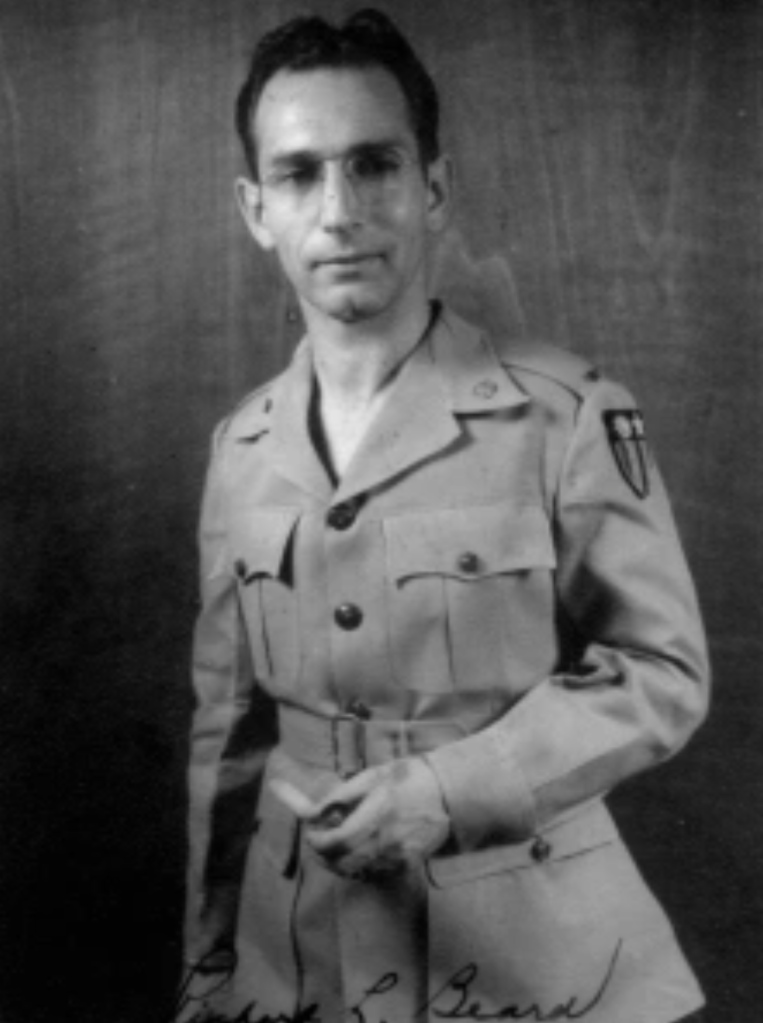
My adoption history begins with a 1930s love story, that of my adoptive parents Richard and Reva Beard. They’d been teenage sweethearts in Findlay, Ohio, they married in 1937, and they put off starting their family until my father-to-be earned his doctorate from Ohio State University.
For six years, while Richard earned his PhD in clinical psychology, Reva taught elementary school. When it turned out that they were not able to have children, they decided to adopt. The outbreak of World War II, however, further delayed the formation of a family.
Richard was drafted and sent to India. He served as a clinical psychologist in charge of a neuropsychiatric ward at the 142nd General Hospital in Calcutta, part of the China-Burma-India theater of the WWII. For 18 months, my future adoptive parents were separated by 6,000 miles. My mother-to-be lived at home with her parents in Findlay, Ohio. She continued to teach school and inquired into adopting a baby. Without a dad in the home, however, adoption proved impossible.
Devoted to one another for a lifetime, Richard and Reva exchanged letters every day of their wartime separation. Sometimes they alluded to adopting a child; Always they reaffirmed their strong love and devotion for one another. My divorced birth mother attended college where Richard was a guidance counselor. As far as I can tell, she asked him to help her by taking my brother and me. I was five and my brother nearly two.
Years later as I read through my parents’ wartime letters, I was moved and inspired by the depth of their love.
Here is one of my favorite Richard and Reva epistles:
Calcutta, India
May 29, 1945
Dearest Reva,
You asked why I had white roses delivered to you on May 16. It was a sentimental and romantic gesture in which the traditional meaning of the colors of flowers was invoked. But to my way of thinking I could as well offer a white rose upon the altar of my love for you each day. Purity is as much a lovely characteristic of your being today as it was the first time I touched your hand in 1930. By some miracle, your contact with life—with me— has not coarsened you. I reflect upon you and me in the car under the moonlight, in the front room listening to “Moon River,” and in the bed we have shared, I am aware that I have approached you each time as a man who knows his love for the first glorious union of body and soul
How much our separation has meant to me I dare not put on paper. Perhaps, just before I sail for home, I may try. But rather by far that I be permitted to demonstrate in a real way what I mean. You will not have to cling to me, you are me.
Perhaps in all this I am idealizing, but I think not. this low, weary year has given me time to consider many things, the significance of which has been blurred in the past. Clearcut, sharp and pure, etched against the certificate of our union as a palm tree silhouettes against the blue of a late Indian evening, is the world-crashing, world-engulfing, between-you-and-me eternal fact: I am so glad that you married me.
Goodnight, precious Ritter. I’ll help moisten that pillow soon, from which I have so often seen your large brown lovely eyes watching me. They are looking down on me now, Reva.
In devotion,
Dick
I’ve recounted my adoptive parents’ story in From Calcutta with Love-The WWII Letters of Richard and Reva Beard. Their love for each other became a gift of love for me.
Originally published in 2022 by Texas Tech University Press, From Calcutta with Love sold out a decade ago. It was acquired by Pajarito Press (Los Alamos, New Mexico) and will appear in a new edition in spring of 2024.



What a beautiful letter–it brought tears to my eyes.
“For 18 months, my future adoptive parents were separated by 6,000 months.”
Is that sentence correct or did you mean to write “6,000 miles”….???
Good grief- I meant 6,000 miles. Just goes to show, I shouldn’t have been editing at midnight.